How our Mother (Nature) made green sand
There are many environmentalists across the world who would love to string us up (with organic rope) for being mindless status-obsessed eco-vandals with the audacity to use fuel heavy Mercedes G-Wagons for safaris. And you know what, they are right! There is no denying that a CO2 output of 205.5 g/km is not great but it is still less than a Toyota Landcruiser (271.0 g/km) and less than half of the whopping 412g/km of a Hummer H2. Yet, we are not waiting for a call from Nobel to see if we have a nomination based on our relatively frugal vehicular outputs. So it seems we started on the back foot when looking at running a sustainable safari operation. Salvation however, came from our Mother, Mother Nature that is.
Solar Power
With an average of 360 days of sunshine, solar energy seems to be a rather obvious form of power generation in the UAE. So it may come as a surprise to learn that Platinum Heritage is operating the first desert safari camp operating purely on solar power. I would love to explain why it has taken so long for anyone to take the plunge but I really can’t come up with any good reasons. Our solar installation will be generating at least 85% of the power it does today in 10 long years. However, our initial investment in the system will be returned in just 12 months compared to running and servicing a diesel generator. We have the luxury of silent power generation rather than the chugging of a diesel engine. We have significantly reduced the risk of fire. We have installed energy efficient LED lights which last for thousands of hours longer than traditional bulbs. We avoid the risk of fuel and oil leaking into the sand and polluting the ground water. So many advantages and yet not one single disadvantage. Thanks to Mother Nature, ever-present sunlight helps us run a more efficient camp.

The UAE’s only solar powered desert camp
Natural Materials
Two of the keys to limiting environmental impact are to consider the depreciation time of the equipment and the building materials used. Basically, you want to build something once rather than replacing it often. Previous generations understood this and would buy furniture that was incredibly expensive but was a once in a lifetime purchase. Somehow, I can’t see our great grandchildren hunting Antique Shops for 100 year old IKEA furniture. Using this principle, we looked to natural materials to build the infrastructure and items inside our Heritage Camp.
- Stone Walls – Using building methods traditionally used by mountain tribes, our stone wall was constructed very slowly and precisely. Taking a team of 20 men, 3 weeks and thousands of stones, our stone wall not only creates protection against heavy winds, creates a natural air-conditioning system for our camp and looks amazing, it is also there for life. Desert safari camps traditionally use a material called Barasti which is made of dried palm leaves. While very inexpensive, Barasti needs to be replaced after every heavy storm and then several times a year after they start to whither. Considering how many palm trees would need to be without their leaves in order to surround a camp for years and years, it quickly becomes apparent how many trees our humble stone wall will save.
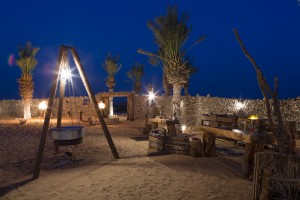
Natural, functional and sustainable
-
- Gravity – Want to save power on a water pump? Simply elevate your water tanks and let nature take its course (literally)
.
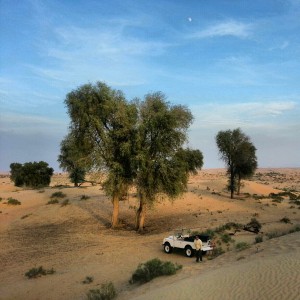
Ghaff tree’s – fallen trees have a second chance at life as dinner tables
- Homemade tables – After searching for weeks and weeks looking for tables, inspiration struck after resting on a fallen tree and realizing that we were sitting on the solution. Apparently we were the only people who had been struck with this type of inspiration and had to find a Dhow builder who was the only person we could find with the equipment required to cut our tree into tables. Now we have beautiful tables courtesy of a tree which would normally have become firewood.
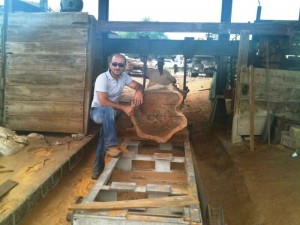
Bassam the table maker
- Bathrooms without plaster, rubber, plastic or metal! That was the challenge set to our incredibly talented Director of Operations, Bassam. What he constructed was a piece of art which is functional and will outlive all of us.
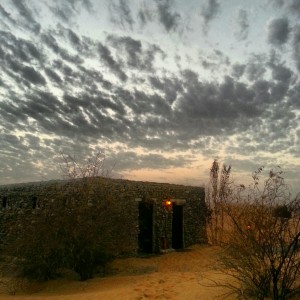
When function becomes ART – our Bathroom
- Goat Hair – Doesn’t sound like a useful eco-weapon? It is when goat hair is used to create ultra-strong tents, used by Bedouins for generations. While they are almost 3-4 times more expensive than replicas which are almost indistinguishable from the real thing, they are both wind and water resistant and they last 10 times longer.
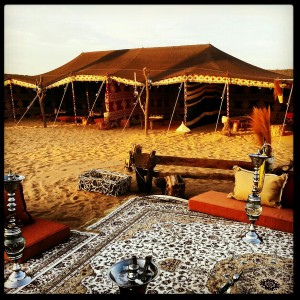
Silk carpets and goat hair tents – hidden eco weapons
- Silk Carpets – We know it sounds very opulent, but our silk carpets are little eco-warriors. Built to last a lifetime, the carpets are very expensive to purchase initially but pay themselves back numerous times over compared to the cheap, disposable carpets used elsewhere.
- Cast Iron – When looking for pots for our soups and signature dish, Ouzi; we looked to Cast Iron which is built to withstand everything nature can dish out and will do so forever.
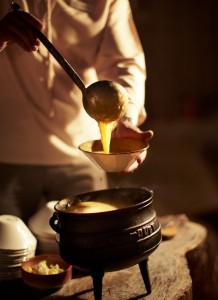
Built to last – forever
Land Rovers
Since driving a Toyota Prius through the desert isn’t a feasible option, we have no option but to choose a more functional vehicle which uses more fuel. However, fuel efficiency is only part of the equation when calculating a vehicles environmental impact. It has been estimated that around 30-40% of the total greenhouse gas emissions over the life of a vehicle come from its manufacture (up to 60% for a hybrid). Scrapping creates large quantities of non-recyclable plastics, toxic heavy metals, asbestos, CFCs, PCBs and rubber products, all of which have to be disposed of. So you can argue that by keeping an old vehicle on the road instead of scrapping it and buying another one is a more eco-friendly option. Since Landcruisers and Hummers used for safari’s need to be replaced every 5 years in Dubai, this means that our 10 Land Rovers have already saved 12 vehicles each from production and scrap and 120 vehicles collectively. We think that is a pretty powerful eco-credential from the grandfather of the desert. In addition, since these vehicles were built to last, there is a huge demand for second-hand parts, saving these parts from being scrapped and melted down, avoiding yet more environmental damage.

Series 1 Land Rover – 12 generations and still going strong
Contributions to Conservation
We know how important a clean, well preserved and healthy desert eco-system is to our guests. This is why we contribute proceeds from every safari towards conservation. These proceeds go directly towards the monitoring, care and preservation of the Dubai Desert Conservation Reserve. This is the largest conservation project in the UAE and the only place you can see the Arabian Desert the way it was generations ago, without imported flora and fauna, quad bikes, power lines or rubbish piles. Thanks to their contribution, each guest leaves the desert in a better condition than how they found it

The way nature intended
Although we would never be naive enough to call ourselves an eco-tour, we do aim towards creating a sustainable experience. As a boring text-book once suggested…
Sustainable tourists can reduce the impact of tourism in many ways:
- informing themselves of the culture, politics, and economy of the communities visited
- anticipating and respecting local cultures, expectations and assumptions
- contributing to intercultural understanding and tolerance
- supporting the integrity of local cultures by favoring businesses which conserve cultural heritage and traditional values
- supporting local economies by purchasing local goods and participating with small, local businesses
- conserving resources by seeking out businesses that are environmentally conscious, and by using the least possible amount of non-renewable resources
Using these points as an indicator, we feel that Platinum Heritage is not only heading in the right direction, we are pioneering sustainable desert tourism in the region. Come on an adventure with us, learn about the local history and culture and help us conserve the national environment of the UAE.

